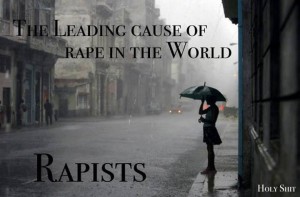Here’s a poster that expresses an important point of view — one that we need to understand when we talk to other women about protecting themselves from violent crime. Awhile back, one of my friends shared it inside a private group on Facebook, and asked the question: “Is this an overly simplistic approach, or a brutal truth?”[ref]Although I don’t usually post pictures from unknown sources, I made an exception for this one I found on Facebook. If you know the source, please do let me know so I can give credit where it’s due. Thanks![/ref]
My thought about this idea is that it’s very simplistic. But that doesn’t mean it isn’t true. It is true, just not complete.
Let me explain where I’m coming from on this one by first sharing something I wrote in The Cornered Cat: A Woman’s Guide to Concealed Carry. It’s toward the front of the book, because as I thought about the people who would be reading my book, I knew some readers would be people who have suffered from criminal actions in the past. Here’s what I said:
[I]f you have survived a violent crime, YOU ARE NOT TO BLAME FOR ANY ASPECT OF THAT CRIME. Period, full stop. The criminal—and only the criminal—is to blame. Not you. Not in any way. Not ever.
To some people, any discussion of ways to avoid or limit the damage from a criminal assault just smacks of blaming the victim. There’s a very fine line indeed between saying, “Avoiding this thing may reduce your risk of being attacked” and saying, “Doing this thing causes criminals to attack.” … Seeing how the entire train of thought so readily runs down the rails to land in Blame-the-Victim Station churns the stomach and creates tremendous, visceral anger. This isn’t an unreasonable reaction to such a painful outcome, but it’s also not helpful for the survivor once she begins looking for ways to increase her own power in the world.
Predators prey. It’s what they do. They find opportunities to attack other people. To help innocent people avoid becoming victims necessarily means discussing the opportunities predators take: how those opportunities happen, when and where they happen, ways to avoid allowing them to happen. Does that mean we’re giving the predator a free pass, or blaming the innocent victim for the crime? Nope. Not at all. All the opportunities in the world won’t cause a good person to turn into a predator. No matter how abundant the opportunities, it is the presence of the predator alone that makes the difference between a crime that happens and a crime that never happens. No matter what the victim did or didn’t do, it is the predator—and only the predator—who chooses whether an opportunity actually becomes a criminal attack. …
[W]e have no control over what choices others (including predators) might make. We can only control our own choices. The predator might attack or walk away without attacking, a choice utterly beyond our control. But that does not mean we have no power at all. We do have power: the power to limit the number of opportunities we offer to the predators among us, and the related choice of how we respond if we are violently attacked.”
So here we are back at that poster. Rapists — people who decide to rape someone, then carry out that plan — are, in actual fact, the only cause of rape in the world. If nobody ever decided to do that thing, that thing would never be done. This is true regardless of what choices women make or don’t make. Yes, we can talk about odds and probabilities. But it still boils down to people deciding to prey on other people.
There are many, many women who have been raped or suffered from other types of violence while they were minding their own business, stone cold sober, inside their own homes, with the doors locked, dressed modestly. Those of us who tell others how to reduce the possibility of being attacked need to keep that knowledge constantly in mind. We have absolutely no guarantees to offer anyone here. We simply have possibilities and probabilities — and every possibility we offer is absolutely negated by the choice of criminal to be a criminal and behave in criminal ways.
We can do nothing, absolutely nothing, about the criminal’s choices in the immediate moment. This is why we don’t simply teach avoidance! We don’t just tell people to stay out of bad situations. We also teach response, what to do when you find yourself in a bad place. We do that because we know that avoidance is imperfect at best.
Our own choices never cause a criminal attack. Ever.
All the same, we can make choices that reduce the opportunities that evil people have to do their thing.
We cannot control what other people do. Ever.
But we can look to our own choices. We can decide that — as much as it lies within our own power — we will avoid letting anyone else’s bad choices destroy us.






Pingback:Manifesto | Cornered Cat